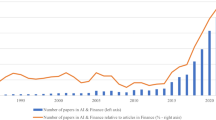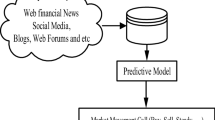Abstract
In the current corporate governance literature, most studies on executive characteristics only focus on the relationship between a single executive characteristic and company performance, and lack a comprehensive analysis of executive characteristics; on the other hand, they mainly focus on causal inference. This article uses the Boosting regression tree algorithm in machine learning to thoroughly investigate the relationship between the company's multidimensional performance characteristics and performance, while avoiding the weaknesses of traditional linear models and is more suitable for analyzing nonlinear and interactive relationships between variables. This article uses listed companies from 2015 to 2020 as a sample to empirically evaluate the ability of executives to predict company performance, further dig out the personal characteristics of executives with strong ability to predict company performance, and describe their prediction mechanism. Experiments have shown that the cross-term coefficient of the proportion of senior management’s shareholding and age is − 0.028, showing a significant correlation (P = 0.005 < 0.05), and the cross-term coefficient of the proportion of senior management holdings and education is − 0.003, showing a significant correlation (P = 0.005 < 0.05), which shows that the management analysis of executives' personal characteristics and corporate performance based on machine learning is more accurate than other traditional technical analyzes, which also opens the future corporate governance performance a new direction of research, and the use machine learning and deep learning algorithms for governance decisions can also reduce the involvement of human factors in future corporate performance governance.






Similar content being viewed by others
Availability of data and material
The data and material that support the findings of this study are available from the corresponding author upon reasonable request.
References
Alvarez AM, Louveaux Q, Wehenkel L (2017) A machine learning-based approximation of strong branching. Inform J Comput 29(1):185–195
Assouline D, Mohajeri N, Scartezzini JL (2017) Quantifying rooftop photovoltaic solar energy potential: a machine learning approach. Sol Energy 141:278–296
Benjamin SL, Alán A-G (2018) Inverse molecular design using machine learning: generative models for matter engineering. Science 361(6400):360–365
Buczak A, Guven E (2017) A survey of data mining and machine learning methods for cyber security intrusion detection. IEEE Commun Surv Tutorials 18(2):1153–1176
Chomchuen S, Suwannamek O, Srinuan C (2019) Determinants of ethical leadership performance of stock exchange of Thailand (Set) executives. Asia-Pac Soc Sci Rev 19(1):105–124
Claudia DR et al (2018) “Reactive Ethnicity” or “Assimilation”? Statements, Arguments, and First Empirical Evidence for Labor Migrants in Germany. Int Migration Rev 40(4):786–816
Crawford CL, Omery A, Spicer J (2017) An integrative review of 21st-Century roles, responsibilities, characteristics, and competencies of chief nurse executives: a blueprint for the next generation. Nurs Admin Q 41(4):297–309
Dimmock SG, Kouwenberg R, Mitchell OS et al (2016) Ambiguity aversion and household portfolio choice puzzles: empirical evidence. J Financ Econ 119(3):559–577
Guidice R (2019) The determinants and performance consequences of Ceo strategic advice seeking. J Gen Manag 44(4):232–242
Hass LH, Johan S, Schweizer D (2016) Is corporate governance in China related to performance persistence? J Bus Ethics 134(4):575–592
Jean N, Burke M, Xie M et al (2016) Combining satellite imagery and machine learning to predict poverty. Science 353(6301):790–794
Kare M, Hasi T (2016) Corporate governance, firm performance, and economic growth—theoretical analysis. J Bus Econ Manag 17(1):35–51
Kim HJ, Kim MJ, Kim DS (2017) Study on the effect of personality type and emotional labor on job satisfaction and turnover intention. Int J Tour Hosp Res 31(6):21–32
Kowalewski O (2016) Corporate governance and corporate performance: financial crisis. Manag Res Rev 39(11):1494–1515
Madanoglu M, Karadag E (2016) Corporate governance provisions and firm financial performance: the moderating effect of deviation from optimal franchising. Int J Contemp Hosp Manag 28(8):1805–1822
Mathai S (2018) An efficient electrochemical approach for characterization of the interface strength of nano Titania-Silica (TS) composite coating on titanium implants. Orient J Chem 34(4):2180–2186
Paletta A, Alimehmeti G (2018) SOX disclosure and the effect of internal controls on executive compensation. J Account Audit Finance 33(2):277–295
Pillai R, Al-Malkawi HAN (2018) On the relationship between corporate governance and firm performance: evidence from Gcc Countries. Res Int Bus Finance 44:394–410
Plouvier S, Carton M, Cyr D et al (2016) Socioeconomic disparities in gait speed and associated characteristics in early old age. BMC Musculoskelet Disord 17(1):1–10
Rugivan SL et al (2019) In human nephrectomy specimens, the kidney level of tubular transport proteins does not correlate with their abundance in urinary extracellular vesicles. Am J Physiol Renal Physiol 317(3):F560–F571
Sacha D, Sedlmair M, Zhang L et al (2017) What you see is what you can change: human-centered machine learning by interactive visualization. Neurocomputing 268(11):164–175
Tajbakhsh N, Shin JY, Gurudu SR et al (2016) Convolutional neural networks for medical image analysis: full training or fine tuning? IEEE Trans Med Imaging 35(5):1299–1312
Toman RM, Novak GL (2019) The (Lack Of) demand for performance information by the Croatian Parliament. Transylv Rev Adm Sci 15(58):100–115
Xu Y, Zhang L, Chen H (2017) Board age and corporate financial fraud: an interactionist view. Long Range Plan 51(6):815–830
Funding
This work was supported by Social Science Project of Beijing Education Committee (Project Number: SM202010017002), Beijing Modern Industrial New Area Development Research Base Special Fund Support Project and National College Student Innovation Entrepreneurship Training Program (Project Number: 2019J00015).
Author information
Authors and Affiliations
Contributions
LY: Conceptualization, Methodology, writing-reviewing; JL: Data curation, Writing- Original draft preparation; ZF: Visualization, Investigation; DY: Writing–Reviewing and Editing.
Corresponding author
Ethics declarations
Conflict of interest
These no potential competing interests in our paper.
Ethics approval
This article does not contain any studies with animals performed by any of the authors. This article does not contain any studies with human participants or animals performed by any of the authors.
Additional information
Publisher's Note
Springer Nature remains neutral with regard to jurisdictional claims in published maps and institutional affiliations.
Rights and permissions
About this article
Cite this article
Yang, L., Liu, J., Fan, Z. et al. Governance of executive personal characteristics and corporate performance based on empirical evidence based on machine learning. J Ambient Intell Human Comput 14, 8655–8665 (2023). https://doi.org/10.1007/s12652-021-03623-w
Received:
Accepted:
Published:
Issue Date:
DOI: https://doi.org/10.1007/s12652-021-03623-w




